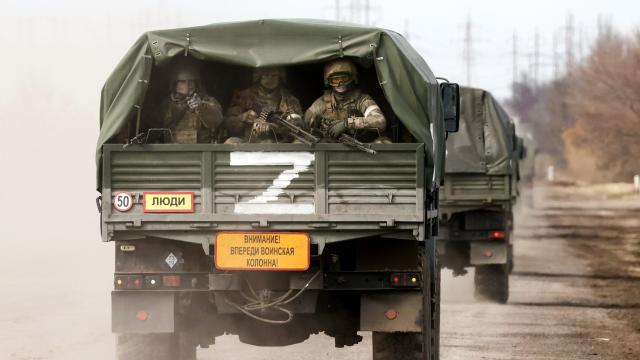NBC reports that President Joe Biden has been presented with a “menu of options” for massive cyberattacks against Russia, an obvious retaliation for Putin’s illegal military campaign in Ukraine. However, the White House has since denounced the report, claiming that it does not “reflect what is actually being discussed in any shape or form.”
In case you’re somehow out of the loop, Russia invaded Ukraine on Wednesday — unleashing an assault that has left at least 40 Ukrainian soldiers dead and involved a series of bombings against cities and towns across the country. The invasion, which Russian President Vladimir Putin has dubbed a “special military operation,” follows the disintegration of long-suffering negotiations between Ukrainian and NATO-allied governments and Russia over the political future of the country.
As Western nations have scrambled to respond, commentators have worried that the Ukrainian situation could spill out into a broader international conflict. One of the most obvious ways this could happen is via a shooting war between nation-state hackers — a fact that makes the disputed news that Biden officials are considering a cyberattack on the Kremlin, uh, somewhat concerning.
On Thursday, NBC reported that the President had been presented with a number of unprecedented options for cyberattacks against Russia, including ones that could disable the country’s electrical power grid, take out its internet, or, even, hobble Russian railway switches as a means of incapacitating its military resupply efforts.
NBC reports:
Two U.S. intelligence officials, one Western intelligence official and another person briefed on the matter say no final decisions have been made, but they say U.S. intelligence and military cyber warriors are proposing the use of American cyberweapons on a scale never before contemplated.
The attacks, which would likely be carried out by elements of the NSA, CIA, or U.S. Cyber Command, could be “pre-emptive,” regardless of whether Russia carries out cyberattacks against the U.S. first, the sources said. They also noted that “most of the potential cyberattacks under consideration are designed to disrupt but not destroy, and therefore fall short of an act of war by the United States against Russia.” However, officials are allegedly split on whether such attacks would be a good idea, as they could represent a dangerous escalation of the conflict between the two countries.
The prospect that the U.S. would be considering retaliation for the Ukraine invasion should be obvious enough, but not long after the NBC report emerged White House Press Secretary Jen Psaki took to Twitter to denounce it:
This report on cyber options being presented to @POTUS is off base and does not reflect what is actually being discussed in any shape or form.
— Jen Psaki (@PressSec) February 24, 2022
Meanwhile, Ken Dilanian, one of the NBC reporters behind the story, was quick to defend its accuracy:
We stand by our story. https://t.co/4CwAgsQBYu
— Ken Dilanian (@KenDilanianNBC) February 24, 2022
Again, the notion that the White House would be, at minimum, considering retaliative measures makes sense. Chair of the U.S. Senate Intelligence Committee Sen. Mark Warner said in an interview Thursday that, under the current circumstances, America could certainly be forced to launch digital attacks. According to Warner, such a response would likely be triggered if Russia cyberattacked the U.S. or one of its allies, or if an attack on Ukraine were to spin out of control and affect regional NATO partners.
But if the likelihood of a digital engagement between Russia and the West is high, so are the risks involved. Russia has a number of formidable and well-known cyberweapons at its disposal that could royally screw with us. The Russian military hacking group “Sandworm” is known for its ability to carry out complex cyberattacks such as the 2015 attack on Ukraine that temporarily brought down parts of the nation’s power grid. On top of this, Russia is home to a thriving cybercriminal underworld — the likes of which is alleged to enjoy unofficial ties to the Russian government. Cybersecurity expert Dmitri Alperovitch told Axios Thursday that Putin could respond to U.S. sanctions by giving Russian ransomware gangs “carte blanche” to attack Western targets, effectively deputizing them as digital paramilitaries in a noxious retaliation campaign.
Of course, all of this is purely speculative, though the fluid nature of the situation in Ukraine means that a lot is possible right now. Pretty much nothing is off the table. And, of course, the biggest risk of a digital incursion is that it could ultimately lead to other kinds of military engagement. Conflict analysts have long warned that cyberwar could swiftly lead to more catastrophic conflict, i.e., you know, nukes and stuff. So, not for nothing but I hope the Pentagon’s cyberwarfare planners do try to remember that, in addition to robust digital capabilities, Russia certainly has a helluva a lot of nukes.
